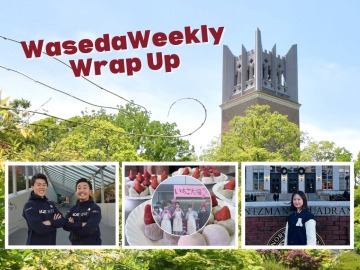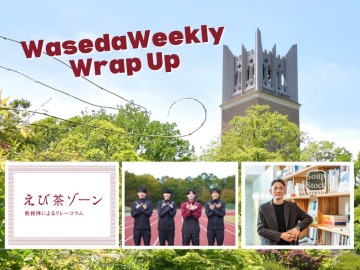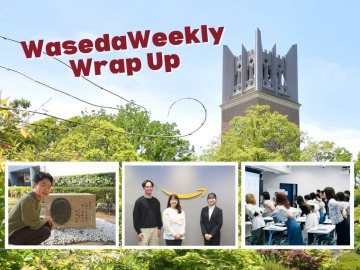Professor Yamada, Please Tell us, “How Do We Keep the Peace?” Part 2
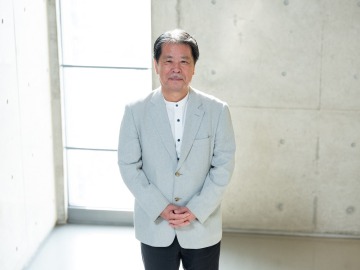
In the series “Lectures by Experts,” four professors provide hints about how to potentially solve some of the problems that challenge society. The theme for 2023 is, “How Do We Keep the Peace?” Following Russia’s invasion of Ukraine and the development in Palestine, it is necessary to rethink what peace is. Waseda Weekly’s fourth and final guest is Professor Mitsuru Yamada (Faculty of Social Sciences), who researches peacebuilding theory and international cooperation theory with a focus on fieldwork. For Part 1 of the interview, he shared his thoughts on peace and the perspectives necessary to protect it. In Part 2 of the interview, he imparted what students can do for peace and concluded with a message for Waseda students.
For many years, Professor Yamada has done fieldwork around the world, so Waseda Weekly asked him how he sees the current state of world affairs. He began by comparing the world in the 1970s, when he was a student, with now, a key difference being “globalization.” He shared that, broadly speaking, in the past it was possible for each country to solve its own problems alone, but now the problems have become increasingly complex and transcend national borders. He gave the example of the problem of poverty disparity between developed and developing countries, which has now developed further into a problem within both developed and emerging countries. On top of that, he mentioned climate change. In recent times, people are forced from their homes not only because of conflict but increasingly due to natural disasters, which only makes the plight of refugees more complicated. He concluded by sharing his belief that the challenges facing the international community are becoming more complex and diverse through globalization, and risks are intertwined creating “compound crises.” To understand such complex crises, everyone must make an effort to visit the sites and listen to the stories of those involved, which is why Professor Yamada takes his students on fieldwork whenever possible. In addition to seeing with one’s own eyes, such fieldwork supports the development of students’ imagination, which, for Professor Yamada, is the first step towards peacebuilding.
The interview ended with Professor Yamada describing peace as a “public good,” similar to parks and traffic lights, which are made possible due to the support of citizens. He stated that the same goes for peace, and that everyone shouldn’t just be “free riders.” Voting is the bare minimum, but Professor Yamada also hopes students will try to imagine what is happening in the background of the news reports they see every day. He also pointed out that students have certain advantages, such as the ability to take long vacations, and recommended using those opportunities to find how their areas of interest relate to peace.
Japanese article:「平和をどう守る?」教えて! 山田教授(後編)
Experiencing the Importance of Inter-cultural Exchange through the “BXAI Summer Program”
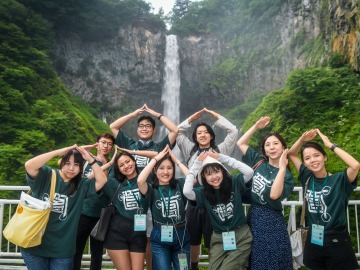
Izumi Kim, a fourth-year student in the School of Advanced Science and Engineering, participated in the 2023 BXAI Summer Program from August 4-18 as a student advisor on behalf of Waseda University. The BXAI Summer Program is managed by Hong Kong’s BAI Xian Asia Institute, or BXAI for short. Participants of The Asian Future Leaders Scholarship Program (AFLSP) gather at the annual event to learn together by engaging in various workshops and cultural activities. Each year, BXAI partner universities take turns hosting the event. Waseda University hosted the event this year and welcomed 68 participants from all over Asia in the first in-person event in three years.
Izumi described her time as a student advisor as a transformative experience which broadened her outlook. Through her role, which involved preparing for and support of various activities, Izumi was struck by the participants’ ambition and the great amount of effort they put into their student life. Izumi oversaw a group of students who all had big dreams, including a student who started a youth organization involved in regional development and urban planning in Southeast Asia, a student who wanted to deepen their understanding of their current major and work in academia, and a student who wanted to take advantage of their experience studying in multiple countries to pursue work internationally. Izumi also acknowledged their language abilities, with many participants fluent in several languages, and expressed how it helped motivate her to continue her language study.
The 2023 BXAI Summer Program’s overall theme was “Transformation of Globalization.” Each day was filled with workshops and seminars related to politics and economics in Asia, AI, carbon neutrality, recycling of resources, self-analysis, leadership, entrepreneurship, and other ideas to promote the theme. Izumi related how the program is not all about academics; one of its biggest draws is the opportunity to interact with other students through sports, day trips, and research trips. To conclude her report, Izumi expressed her wish to participate in more cross-cultural exchange programs like BXAI, as she does not get many opportunities to interact with students from Asia.
Japanese article:“百賢サマープログラム”で感じた異文化交流の大切さ
Changing Society Through Content Distribution that Makes You Feel Closer to Gender
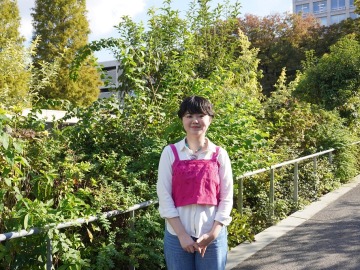
Kei Onishi is a fourth-year student in the School of Culture, Media and Society who studies gender* and works as a student staff member at Waseda’s Gender and Sexuality Center (GS Center), while also creating and managing the podcast “Namisen” (or Wavy Lines in English). She produces one podcast and YouTube video per week on the theme “chatting about gender.” Waseda Weekly talked with Kei about how she became interested in gender, her current activities, and her plans for the future.
Kei remembers herself as an outspoken and assertive child. People around her often labeled her as “strong-willed” and “a powerful girl”, but she couldn’t understand why they never said the same about boys. While researching about where to go to university, she learned that the concept that she had no words for as a child was “gender” and that she could study it at Waseda University’s School of Culture, Media and Society. For Kei, the positive aspect of Waseda is that there are so many people who work on gender issues, including Associate Professor Noritaka Moriyama (Faculty of Letters, Arts and Sciences), Professor Keiko Kusano (Faculty of Letters, Arts and Sciences), Associate Professor Arisa Iwakawa (Faculty of Letters, Arts and Sciences), and Part-time Lecturer Keiko Atsuta (School of Culture, Media and Society), among others. Kei credits them with introducing her to multiple viewpoints, which led to her own self-reflection.
Waseda Weekly then asked Kei about her work at the GS Center. Kei shared that she learned about the center while trying to find options outside of class to deepen her learning. It is a place for anyone interested in gender and sexuality, including students who identify as LGBTQ+ or any sexual minority and Kei helps with event planning. With regard to her future, Kei acknowledges that her dream of creating a society where anyone can live with peace of mind is a big one, but, at the same time, she felt that the power of chatting is extremely strong. She gave the example of the 45th episode of Namisen titled “Self-Pleasure.” In Japan, it is often considered taboo for women to talk about their sexual desire, but the episode garnered a significant number of views on YouTube. Rather than experts or influencers, Kei believes it is meaningful for ordinary students to chat nonchalantly about such topics.
*The socially and culturally constructed differences between sexes
Japanese article:身近にジェンダーを感じる配信で 社会を変える第一歩に


